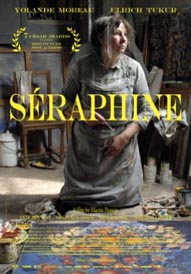
Starts December 17
 Seraphine Louis (1864-1942) lived in the small French town of Senlis. Poor and uneducated, she worked as a cleaning lady for private families as well as the local convent. Her Catholic faith gave her strength, as did a peasant’s appreciation of nature and a determination to paint, which she did, mostly at night by candlelight, with paint she mixed herself from plants and household ingredients. The film opens in 1913 with German Wilhelm Uhde (Ulrich Tukur) moving to Senlis to escape the stress of Paris. By chance he discovers that his household help, Seraphine, has drawn extraordinary naïve paintings of flowers. He is sure that she is an undiscovered genius. He plans to present her work in Paris, along with another new artist: Henri Rousseau. World War I interrupts their friendship, when Uhde, as a German persona non grata, escapes to Munich. After the war, he returns to France, basically to retrieve his painting collection which was confiscated during his absence. He visits an art exhibit in the Senlis city hall and sees works by Seraphine. With his patronage her career takes off; she earns probably more money than anyone in the village. Sadly, signs of insanity manifest, e.g., she overspends lavishly, and predicts the end of the world. The asylum in Clermont-sur-l’Oise is home for her 12 final years. Today her artwork is on display in at least seven art museums, most of them in France, as well as privately.
Seraphine Louis (1864-1942) lived in the small French town of Senlis. Poor and uneducated, she worked as a cleaning lady for private families as well as the local convent. Her Catholic faith gave her strength, as did a peasant’s appreciation of nature and a determination to paint, which she did, mostly at night by candlelight, with paint she mixed herself from plants and household ingredients. The film opens in 1913 with German Wilhelm Uhde (Ulrich Tukur) moving to Senlis to escape the stress of Paris. By chance he discovers that his household help, Seraphine, has drawn extraordinary naïve paintings of flowers. He is sure that she is an undiscovered genius. He plans to present her work in Paris, along with another new artist: Henri Rousseau. World War I interrupts their friendship, when Uhde, as a German persona non grata, escapes to Munich. After the war, he returns to France, basically to retrieve his painting collection which was confiscated during his absence. He visits an art exhibit in the Senlis city hall and sees works by Seraphine. With his patronage her career takes off; she earns probably more money than anyone in the village. Sadly, signs of insanity manifest, e.g., she overspends lavishly, and predicts the end of the world. The asylum in Clermont-sur-l’Oise is home for her 12 final years. Today her artwork is on display in at least seven art museums, most of them in France, as well as privately.
Seraphine the film lets us experience this special life in a slow, calm, quiet manner. Music comes up sparingly at just the right places. The village, houses, clothing, chores, and scenery all mesh to present a perfect French countryside at the turn of the century. The film relies on a small cast of which Anne Bennet as Uhde’s sister, and Tukur are wonderful, but the film lives and breathes through the exceptional talent of Belgian actress Yolande Moreau as Seraphine who dominates almost every scene. She becomes this 50-year-old woman, whom the villagers always viewed as a bit strange. The act of painting puts her into a trance. Or perhaps, it’s vice versa: she escapes into a fantasy and feels compelled to paint. As my fellow critic Adele R. said, “You can not imagine Moreau being any other way, even in real life.” This film, directed by Martin Prevost, won seven French Oscars (called Caesars) including best film and best actress in 2009.
